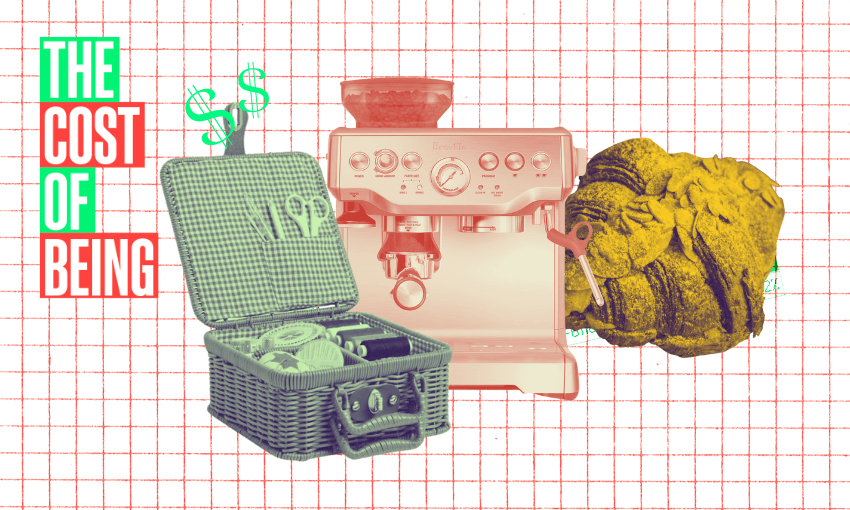As part of our series exploring how New Zealanders live and our relationship with money, a 67-year-old retiree explains her approach to spending and saving.
Want to be part of The Cost of Being? Fill out the questionnaire here.
Gender: Female.
Age: 67.
Ethnicity: Pākehā.
Role: Retired/volunteer.
Salary/income/assets: Living on the pension. Own few assets – just enough to put me over the limit to be able to get an accommodation supplement.
My living location is: Small town.
Rent/mortgage per week: Currently pay $285 to rent a bach. It’s not ideal, but it is good value. It is now up for sale, and I will not get anything as good for under $400.
Student loan or other debt payments per week: I earned so little in years leading up to turning 65 that I didn’t reach the repayment threshold and so was a bit shocked on getting the pension that I would now have to pay back $17 a week.
Typical weekly food costs
Groceries: $50-$80. Just me, and I no longer have a pet because it’s too expensive. I make almost everything from scratch and batch cook, but I do like to eat a healthy and varied diet.
Eating out: Averages $20. Lunch in town about once a fortnight.
Takeaways: $5. Can’t resist an ice cream.
Workday lunches: None.
Cafe coffees/snacks: $10 average. Sometimes you just have to have a cuppa but I avoid buying tea when out because it’s rarely good, and if I meet someone at a cafe I’d rather have a muffin or cake instead.
Savings: While my rent is relatively low I am able to save about a $100 most weeks.
I worry about money: Sometimes.
Three words to describe my financial situation: Disciplined. Adequate (for now). Precarious (the future).
My biggest edible indulgence would be: Darjeeling tea.
In a typical week my alcohol expenditure would be: $0. I gave up smoking and drinking decades ago, and I now live on the amount I would have spent on those alone which is kind of mind-boggling!
In a typical week my transport expenditure would be: $2. I use my Gold Card on the bus to town, and only occasionally need to get a bus in peak times. I walk and cycle locally.
I estimate in the past year the ballpark amount I spent on my personal clothing (including sleepwear and underwear) was: Maybe $100? Everything but undies and shoes come from op shops, and hand-me-downs from friends who put on weight.
My most expensive clothing in the past year was: $70. Wool to knit a jersey, but I think of it as more of a hobby/entertainment cost.
My last pair of shoes cost: $165 for tramping boots that I wear as my everyday footwear. I have small feet and finding adequate footwear is very difficult. I had recently found some that were very good and when I saw them in a 50% off sale I bought another pair. They are still in storage for when I finally wear out the original pair.
My grooming/beauty expenditure in a year is about: Less than $100. Cut my own hair. Shampoo, basic moisturiser.
My exercise expenditure in a year is about: None. I walk and garden for exercise.
My last Friday night cost: Nothing. I loathe going out at night.
Most regrettable purchase in the last 12 months was: I can’t afford to make regrettable purchases so I think hard and research before buying anything I have to.
Most indulgent purchase (that I don’t regret) in the last 12 months was: I bought a really good scythe.
One area where I’m a bit of a tightwad is: I don’t think of myself as a tightwad. Living lightly is a lifestyle choice.
Five words to describe my financial personality would be: Careful, ethical, ingenious, frugal, unusual.
I grew up in a house where money was: Money had been tighter with four older siblings but by the time I came along my father had a good job and my siblings were leaving home so I had it better than they had. But my father never shook having been poor when young and seemed to me to at the time to be stingy. I think they might’ve over-extended themselves to buy into an upmarket suburb and I felt we were poorer in comparison to others at school, when in fact we were comparatively well off.
The last time my Eftpos card was declined was: 2007, and it was the bank’s fault.
In five years, in financial terms, I see myself: With the current political direction, I see myself a lot worse off than I am now.
Describe your financial low: Being unemployed in the early 90s when the benefits were cut and rent for the most basic flat on my own was 80% of my income.
I would love to have more money for: To support causes I feel strongly about. I’d buy myself a tiny house if I could.
I give money away to: Small amounts to climate and social justice orgs. Generally, I offer time volunteering in lieu of financial donations. I sub a struggling friend when I can.



